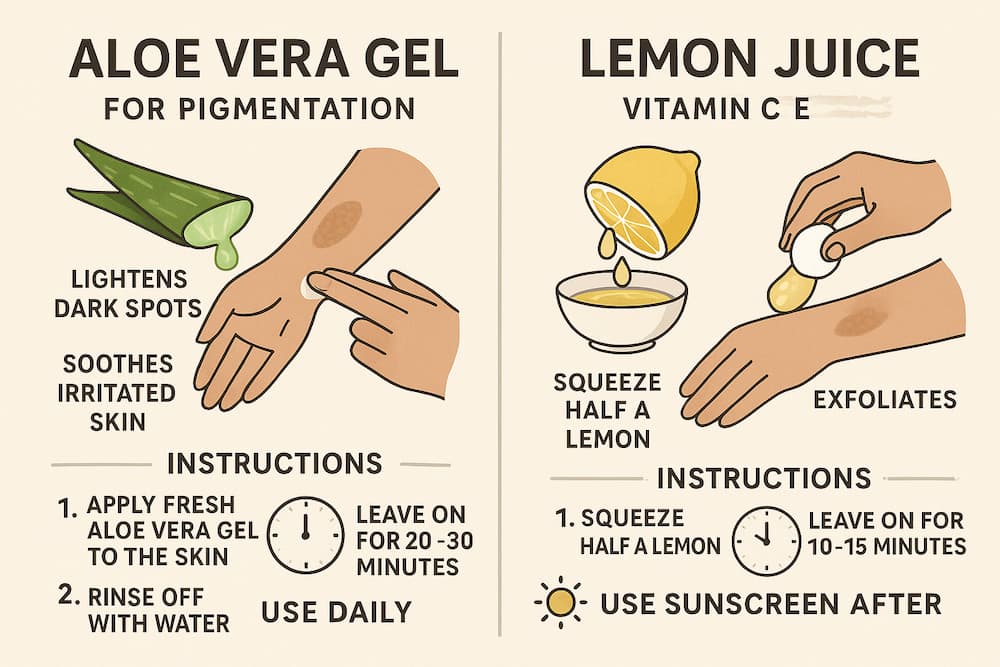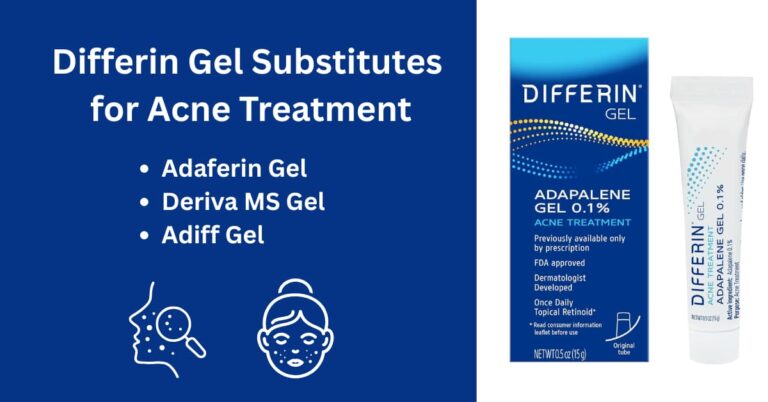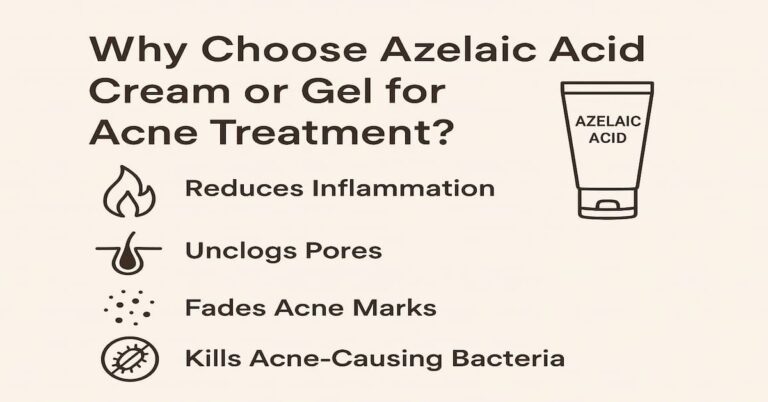Pigmentation issues, including dark spots, melasma, and post-inflammatory marks, can occur due to various factors such as sun exposure, hormonal changes, acne, or aging. While professional treatments are available, many people in the UK prefer using natural remedies at home. These remedies are not only effective but also cost-efficient. Here are seven top home treatments that can help reduce pigmentation and even out your skin tone.

1. Aloe Vera Gel
Aloe vera is known for its natural healing properties and can help lighten dark spots and pigmentation. It contains aloin, a natural compound that can reduce melanin production in the skin.
- How to Use:
- Extract fresh aloe vera gel from a stalk.
- Apply it directly to the pigmented areas of the skin.
- Leave it overnight and wash it off in the morning.
- Frequency: Apply daily for the best results.
- Additional Tip: Aloe vera can be soothing for irritated skin and is gentle enough for sensitive skin types. It’s an excellent addition to your nightly skincare routine.

2. Lemon Juice
Lemon juice is packed with vitamin C and citric acid, both of which have skin-brightening effects and help fade dark spots over time. The citric acid in lemon juice works as a natural exfoliant to remove dead skin cells, making it easier for your skin to regenerate.
- How to Use:
- Apply fresh lemon juice to the affected areas using a cotton ball.
- Leave it on for 10–15 minutes before rinsing off with lukewarm water.
- Frequency: Use 2–3 times a week.
- Additional Tip: Always apply sunscreen after using lemon juice, as it can make your skin more sensitive to the sun and lead to sunburn.
3. Turmeric and Milk Mask
Turmeric has powerful anti-inflammatory and antioxidant properties that can help even out skin tone, while milk contains lactic acid, which promotes gentle exfoliation and skin renewal.
- How to Use:
- Mix a pinch of turmeric powder with a tablespoon of milk to form a paste.
- Apply the paste to the pigmented areas and leave it on for 15–20 minutes before rinsing off.
- Frequency: Apply 2–3 times a week.
- Additional Tip: If you have sensitive skin, mix the turmeric paste with honey instead of milk to reduce irritation.
4. Papaya Pulp
Papaya contains enzymes, such as papain, that help exfoliate the skin, remove dead skin cells, and lighten dark spots. This fruit can also help to brighten your complexion and improve overall skin texture.
- How to Use:
- Mash a ripe papaya and apply the pulp to the affected areas.
- Leave it on for 15–20 minutes before rinsing it off with lukewarm water.
- Frequency: Use 2–3 times a week.
- Additional Tip: Papaya can also help improve the appearance of fine lines, making it a great treatment for both pigmentation and aging skin.
5. Apple Cider Vinegar (ACV)
Apple cider vinegar contains acetic acid, which helps lighten pigmentation and balance the skin’s pH. It also exfoliates the skin, removing the top layer of dead cells and promoting the growth of fresh skin.
- How to Use:
- Dilute ACV with equal parts water.
- Apply the solution to the pigmented areas using a cotton ball.
- Leave it on for 3–4 minutes before rinsing off with lukewarm water.
- Frequency: Use 2–3 times a week.
- Additional Tip: ACV can be a bit strong for some skin types, so it’s essential to do a patch test before applying it to your face.
6. Cucumber Slices
Cucumber is a natural skin-soothing ingredient that can also help reduce pigmentation. It hydrates and cools the skin, making it a perfect remedy for reducing pigmentation caused by sun exposure.
- How to Use:
- Place chilled cucumber slices on the pigmented areas.
- Leave them on for 15–20 minutes before removing.
- Frequency: Use daily for best results.
- Additional Tip: Cucumber can be used to treat puffiness and dark circles under the eyes. It’s a refreshing and gentle remedy.
7. Rosehip Oil
Rosehip oil is rich in essential fatty acids and vitamins A and C, which help regenerate skin cells, reduce pigmentation, and improve skin texture. It is a great choice for people with sensitive skin who want to lighten pigmentation naturally.
- How to Use:
- Apply a few drops of rosehip oil to the pigmented areas.
- Gently massage it into the skin for a few minutes.
- Frequency: Apply daily, preferably at night.
- Additional Tip: Rosehip oil is lightweight and can be used as part of your nighttime skincare routine for maximum absorption.
Additional Tips for Managing Pigmentation

- Sun Protection: Protect your skin from further pigmentation by applying a broad-spectrum sunscreen with SPF 30 or higher every day. Sun exposure can darken pigmentation and make it harder to fade.
- Hydration: Drink plenty of water throughout the day to keep your skin hydrated and help with skin regeneration.
- Healthy Diet: Eating a diet rich in vitamins A, C, and E, as well as antioxidants, can help your skin heal and regenerate more effectively.
- Consistency: Natural treatments can take time to show results, so be patient. Consistency is key to seeing improvements in pigmentation.
- Sleep Well: Getting adequate rest is crucial for skin regeneration. Aim for at least 7–8 hours of sleep each night to give your skin the time it needs to repair.
FAQ – Common Questions About Pigmentation
1. How long does it take for natural remedies to reduce pigmentation?
Natural remedies can take anywhere from a few weeks to a couple of months to show noticeable results. Consistent application and protection from the sun can speed up the process.
2. Can pigmentation be permanently removed?
While natural remedies can significantly lighten pigmentation and reduce its appearance, complete removal may require professional treatments such as laser therapy or chemical peels, especially for stubborn pigmentation like melasma.
3. Are these remedies safe for all skin types?
Most of these remedies are safe for all skin types, but if you have sensitive skin, it’s essential to perform a patch test first. Some ingredients, like lemon juice or apple cider vinegar, may cause irritation for sensitive skin.
4. Can I use these remedies if I have acne scars?
Yes, many of these remedies, such as aloe vera and rosehip oil, can help reduce the appearance of acne scars as well as pigmentation. They promote skin healing and regeneration.
5. Is sunscreen necessary when using these remedies?
Yes, it is essential to use sunscreen every day, especially when using treatments like lemon juice or turmeric, which can make your skin more sensitive to sunlight.
Conclusion
Pigmentation issues can affect anyone, but with the right care and consistent use of natural remedies, you can achieve a more even skin tone. Aloe vera, turmeric, rosehip oil, and other natural ingredients offer safe, effective, and budget-friendly solutions to reduce pigmentation and enhance your complexion. Remember, it’s important to protect your skin from the sun and maintain a consistent skincare routine to see the best results.



